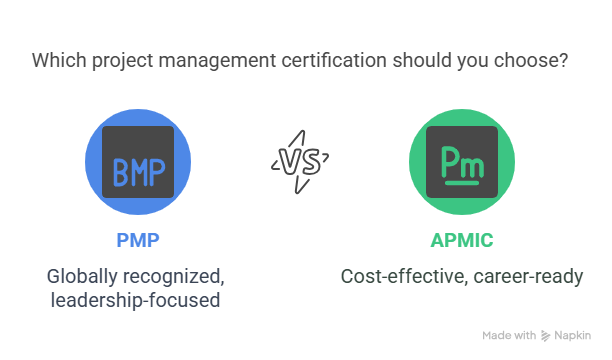Choosing the Right Project Management Certification
Choosing the right project management certification can fast-track your career or waste your time, depending on how aligned it is with your experience, industry, and future goals. In 2025, employers demand more than just credentials—they want proof of tool mastery, domain understanding, and stakeholder-ready communication. That’s why it’s essential to understand which certifications serve different roles, what they cost, and how they align with both agile and traditional methodologies.
Understanding Certification Tiers
Certifications are not created equal. Each is built for a specific tier of professionals—ranging from beginners stepping into coordination roles to senior managers overseeing portfolios across multiple geographies.
Entry-Level Certifications like CAPM and Google Project Management offer foundational frameworks, helpful for those new to Gantt charts, dependencies, and work breakdown structures.
Mid-Level Options such as CSM or AgilePM introduce Agile tools, velocity tracking, and stakeholder rituals essential for adaptive environments.
Advanced Tracks like the PMP or APMIC focus on global scalability, earned value forecasting, procurement, and risk modeling.
For example, if your role involves resource leveling and KPI dashboards, opting for a basic credential will limit your practical use. In contrast, platforms like APMIC’s advanced guide to cost management outline specific terminology you’ll actually use.
Key Certification Comparisons
Here’s how the most recognized certifications compare in terms of audience, pricing, and prerequisites.
| Certification | Best For | Estimated Cost (USD) | Prerequisites |
|---|---|---|---|
| PMP (Project Management Professional) | Experienced PMs leading cross-functional teams | $555 + prep costs | 4,500–7,500 hours of PM experience |
| CAPM (Certified Associate in Project Management) | Beginners or recent grads entering project roles | $300 + optional training | High school diploma or equivalent |
| APMIC Advanced Project Management Certification | Professionals seeking advanced tools & international readiness | $349–$499 depending on access level | Open to all; assumes some PM familiarity |
| AgilePM | Agile-centric mid-level managers | $500–$700 | Agile understanding recommended |
| CSM (Certified ScrumMaster) | Scrum teams and Agile coaches | $400–$600 | Understanding of Scrum basics |
| PRINCE2 Foundation | Public sector or IT environments | $350–$500 | None |
| Google Project Management | Entry-level project coordination roles | $39/month (Coursera) | None |
Industry Relevance and Employer Preferences
Hiring trends have shifted in favor of certifications that demonstrate hands-on experience. Employers are no longer impressed by theoretical badges. Instead, they look for credentials backed by scenario-based assessments, software familiarity, and real deliverables.
Polls across the APMIC certification state directories show that hiring managers prioritize:
Tool proficiency (Jira, Microsoft Project, Primavera)
Methodology flexibility (Agile, Waterfall, Hybrid)
Communication mastery (client updates, retrospectives)
Which factor most influences your choice of certification?
How APMIC Certification Fits In
The APMIC Advanced Certification delivers a hybrid structure combining Agile, PMI-aligned frameworks, and practical modules across:
Risk & cost management
Human resource planning
Global procurement structures
Agile-Waterfall integration
It’s ideal for professionals ready to take on cross-border or enterprise-wide portfolios. The certification includes over 540+ modules, simulation-based case studies, and offers upskilling aligned to critical path methods, budgeting, and stakeholder analysis.
Choosing Based on Your Career Stage
To avoid wasting time, your certification must align with your career stage:
Students / New Graduates
Opt for CAPM, Google PM, or foundational APMIC lessons like team-building terminologyMid-Level Professionals
Consider CSM, PRINCE2, or AgilePM if you're working in an environment adopting iterative planning or scaled Agile frameworks.Experienced PMs
Go for PMP or APMIC if you're leading enterprise-level portfolios, require integrated procurement skills, or managing international project deliverables.
Remember: combining technical tools with domain-specific terminology (such as Six Sigma) dramatically improves your interview visibility.
Strategic Planning: From Entry-Level to Executive
To succeed long-term, your certification path must evolve. Here’s a breakdown of how to stack credentials over time:
| Career Level | Recommended Certification Path | Core Competencies Gained |
|---|---|---|
| Entry-Level | Google PM → CAPM → APMIC Foundation | Scheduling, team dynamics, WBS, cost basics |
| Mid-Level | AgilePM → CSM → PRINCE2 | Sprint planning, stakeholder rituals, change control |
| Senior-Level | PMP → APMIC Advanced | Portfolio management, procurement, KPI tracking |
Frequently Asked Questions
-
PMP is the most recognized globally. It's ideal for experienced professionals, especially in consulting, finance, and government sectors.
-
APMIC is more tool- and simulation-focused, covering international compliance, while PMP is exam-heavy and CAPM is introductory.
-
They’re great for skill sampling but rarely recognized by employers unless backed by CPD hours or structured assessments.
-
CSM or AgilePM. If you want flexibility between Scrum and hybrid methods, AgilePM is better aligned.
-
Google Project Management is among the fastest, requiring 2–4 months. But it’s best used as a stepping stone to APMIC or CAPM.



